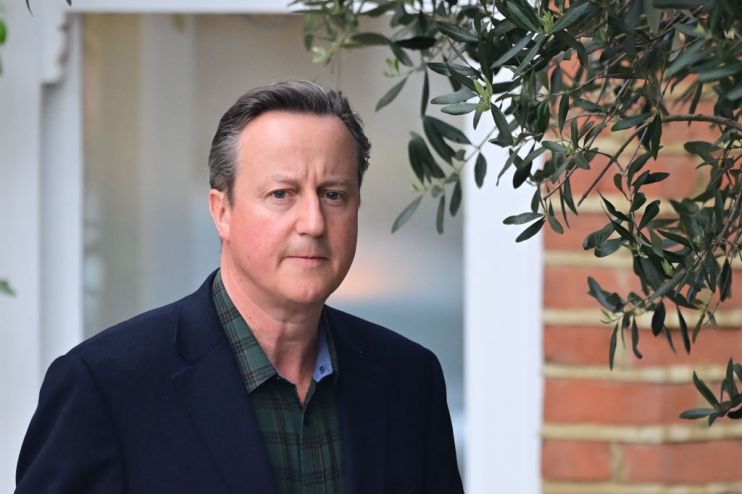David Cameron says he was paid ‘generous amounts’ by failed Greensill Capital

David Cameron has told MPs today that he was paid a “generous amount” by failed Greensill Capital and that he did not think the firm was in trouble when he lobbied a slew of ministers and officials on behalf of the firm.
Cameron told Westminster’s Treasury Select Committee that his almost 60 emails, texts and Whatsapp messages to figures like Rishi Sunak to curry favour for Greensill’s application to an emergency funding scheme was not because the firm was in danger of going bust.
The former Prime Minister’s communications with ministers like Sunak and Michael Gove was compared to stalking by Labour MP Angela Eagle at the committee meeting.
Cameron said he “wanted this business to succeed – I was being paid, I had shares, I had an interest in it”.
“I was paid an annual amount, a generous annual amount – far more than I earned as prime minister,” he said.
“I had shares, not share options, but shares in the business which vested over the period of time of my contract.
“The fact I had this economic interest, serious economic interest, is important, but I don’t think the amount is particularly germane to answering those questions and as far as I’m concerned it’s a private matter.”
The committee released all communication Cameron had in March and April last year with ministers, government civil servants and Bank of England officials.
The explosive texts show Cameron first texted Treasury top civil servant Tom Scholar on 3 March last year to try and get Greensill Capital accepted into the emergency Covid Corporate Financing Facility (CCFF) programme.
The scheme saw the Bank of England buy bonds in investment grade companies to inject emergency cash during Covid-19
Cameron furiously texted Scholar on 3 April when the supply chain finance firm was denied entry into the CCCFF programme after a month of lobbying by the former Prime Minister.
He said he was “genuinely baffled”, that the decision was “bonkers” and that he would be calling “the chancellor, Gove, everyone” to get his way.
Committee chair Mel Stride stated a number of reports from March and April last year that indicated Greensill Capital could fall into financial trouble as it struggled to access the credit market.
Stride said “many people would conclude that at the time of your lobbying your opportunity to make a large amount of money was under threat” and that “losing out on those substantial gains motivated you to conduct this barrage of texts, Whatsapps, emails, meetings to over 60 contacts in total to government ministers and civil servants”.
Cameron denied this was the case.
“That’s not what I thought at the time and that’s not what motivated me, I think there’s a huge difference between constrained capacity in the credit markets and a business failing,” he said.
Angela Eagle asked Cameron if he was embarrassed by the extent of his personal lobbying of government figures.
He said he was not and that “it was a particularly acute time in the British economy” and that he “was keen to get in front of the government”.
“There are lessons to learn and lessons for me to learn and in future the single formal email or formal letter would be appropriate,” he said.
Cameron’s lobbying of government ministers for Greensill Capital is being scrutinised by multiple inquiries, including one by Boris Johnson and one by the Treasury Select Committee.
The Cameron-Greensill lobbying scandal was sparked by a series of damaging stories earlier this year in the Sunday Times and Financial Times about the former PM’s involvement in lobbying the government.
It was eventually revealed that Greensill had been hired as a Cainet Office and Number 10 as a government adviser when David Cameron was Prime Minister, sparking quid pro quo allegations.
Cameron said during a statement during the start of the committee that “nothing I did was in breach of the wider rules” of the government’s lobbying laws and that today was a “painful day”.
“I completely accept former prime minister’s are in a different position to others because of the office we held and the influence that continues to bring,” he said.
“We need to think different and act differently.
“Lobbying itself is a necessary and healthy part of our democratic process, but I accept there’s a strong argument that a former prime minister engages on behalf of any commercial interest no matter how laudable the motives and cause can be open to interpretation.”
Greensill Capital went bust in March this year, leaving creditors more than £1.5bn out of pocket and leaving more than 1,000 people jobless.
The firm operated by helping pay the suppliers of large businesses in a complicated process known as supply chain financing.
Former City minister Lord Paul Myners said weeks ago that the company resembled a Ponzi scheme and that its collapse would indirectly cost taxpayers up to £5bn.
The firm’s founder Lex Greenill was also branded a “fraudster” by two members of the the Treasury Select Committee yesterday – a charge Greensill denied.